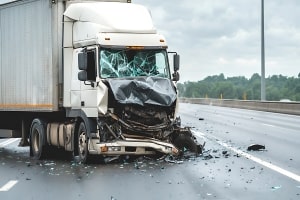
Fleet owners in the commercial trucking industry must choose the right insurance provider and policy for their organization. This choice is more than a regulatory requirement; it represents a strategic decision to prepare the business for any situation with the proper legal and financial safeguards in place.
Regardless of your cargo type, truck size, fleet size, or route locations, the right trucking insurance eliminates coverage gaps and secures excellent coverage for your drivers, vehicles, and business. Here’s what you need to know about fleet insurance and the role it plays in an effective insurance strategy.
How is Fleet Insurance Different?
Most trucking owners recognize the need for commercial auto insurance to protect vehicles and drivers from liability. However, it’s not always clear how fleet insurance differs and why business owners in the trucking industry need to know the difference to protect their operations. Fleet insurance policies usually cover six main policy types:
- Liability
- Physical Damage
- Motor Truck Cargo
- Bobtail Liability
- Workers’ Compensation
- Umbrella
This coverage is similar to other commercial auto policies; however, fleet insurance differs in that it is customized to cover multiple vehicles under a single policy. This can make fleet insurance far more cost-effective for companies managing multiple vehicles while reducing policy management costs, including labor. Having one provider also reduces the business’s risk by increasing flexibility. For example, when adding or subtracting vehicles from the fleet, business owners can simply notify their single fleet insurance provider to update their policy.
Primary Liability Insurance
Primary liability insurance is mandatory for commercial trucking operations according to both the FMCSA and Illinois state laws. This insurance coverage protects businesses from costs related to property damage and bodily injury sustained in accidents caused by the company’s drivers.
The required coverage depends on the cargo, the size of the trucks, and other factors, but ranges from $500,000 for the transportation of non-hazardous cargo within Illinois to up to $5 million for hazardous material transport within the state or across state lines.
Physical Damage Insurance

Physical damage insurance protects vehicles against collisions with other vehicles or objects, theft, certain weather-related incidents, or vandalism. It does not address property damage resulting from a crash, but it does cover the repair and replacement costs of the company’s vehicle, even if no other vehicles or property were involved.
For example, if a truck crashes in a snowstorm, the repair or replacement costs would be covered by physical damage insurance even if no other vehicles were involved. However, if the truck crashed into another driver or someone else’s property, that damage would fall under the purview of liability insurance.
This insurance coverage is necessary for company-owned vehicles, but it is particularly important for vehicles that the business rents or leases. Since the business does not fully own these vehicles, the lender retains financial interest in the truck’s physical condition. If it’s damaged, the trucking company would have to pay for the full cost of repairing or replacing the vehicle to return it to the lender. Physical damage insurance allows the insurance policy to absorb these costs instead.
Cargo Insurance
This type of insurance, as the name suggests, protects cargo, while other types of insurance protect vehicles and drivers. Cargo insurance is not typically mandated by law, but shipping contractors or brokers can contractually require it before dispatch. These policies cover the cargo in the event of damage or theft, while also safeguarding the business from the costs of transportation delays.
For example, some cargo may be time- or temperature-sensitive, leading to unexpected spoilage of potentially high-value items, such as produce or medicine. Depending on the type of load and the value of the cargo, managers need to insure their cargo to cover every possibility.
Bobtail Insurance
Bobtail insurance covers company vehicles when they are being operated without a trailer or without being under dispatch. This insurance is necessary because the fine print of general liability policies usually excludes the vehicle from coverage when it is not on duty. Bobtail insurance extends the coverage to protect the owner-operator of the vehicle during these gaps.
In particular, carriers that lease trucks from other owners should have this policy, as individual auto insurance plans typically do not extend to this kind of commercial usage. Any incidents occurring off-dispatch could form a costly coverage gap without a bobtail policy.
Workers’ Compensation

Workers’ compensation is required coverage to protect workers who are hurt while on duty for the trucking company. It covers medical expenses, disability benefits, lost wages, and legal fees while also protecting the business from liability.
The Illinois Department of Labor requires workers’ compensation policies for employees of trucking companies. However, contractors who operate independently owned vehicles are not usually covered.
Protect Your Fleet With Customized Trucking Insurance Plans
While some types of fleet insurance are mandated by Illinois law, others depend on the business owner’s specific risk factors, cargo types, and workflows. At Pro Insurance Group, our team of knowledgeable advisors helps fleet managers create a personalized risk assessment to find the combination of insurance coverage that makes sense for their businesses.
Contact our team today to learn what insurance coverage your commercial trucking fleet should be carrying and how to update it to meet your changing needs.
